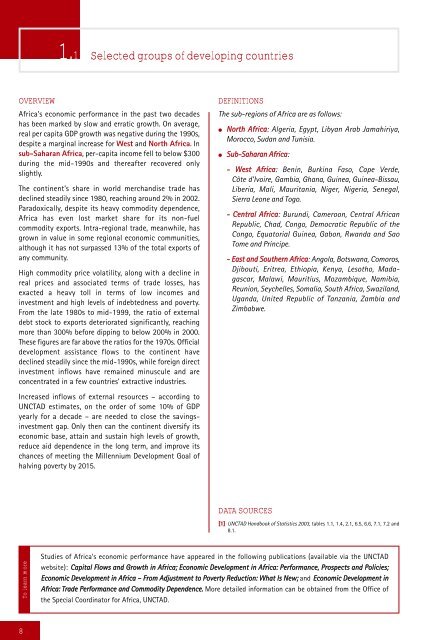Development and Globalization: - Unctad
Development and Globalization: - Unctad
Development and Globalization: - Unctad
Create successful ePaper yourself
Turn your PDF publications into a flip-book with our unique Google optimized e-Paper software.
8<br />
1.1 Selected groups of developing countries<br />
OVERVIEW DEFINITIONS<br />
Africa’s economic performance in the past two decades<br />
has been marked by slow <strong>and</strong> erratic growth. On average,<br />
real per capita GDP growth was negative during the 1990s,<br />
despite a marginal increase for West <strong>and</strong> North Africa. In<br />
sub-Saharan Africa, per-capita income fell to below $300<br />
during the mid-1990s <strong>and</strong> thereafter recovered only<br />
slightly.<br />
The continent’s share in world merch<strong>and</strong>ise trade has<br />
declined steadily since 1980, reaching around 2% in 2002.<br />
Paradoxically, despite its heavy commodity dependence,<br />
Africa has even lost market share for its non-fuel<br />
commodity exports. Intra-regional trade, meanwhile, has<br />
grown in value in some regional economic communities,<br />
although it has not surpassed 13% of the total exports of<br />
any community.<br />
High commodity price volatility, along with a decline in<br />
real prices <strong>and</strong> associated terms of trade losses, has<br />
exacted a heavy toll in terms of low incomes <strong>and</strong><br />
investment <strong>and</strong> high levels of indebtedness <strong>and</strong> poverty.<br />
From the late 1980s to mid-1999, the ratio of external<br />
debt stock to exports deteriorated significantly, reaching<br />
more than 300% before dipping to below 200% in 2000.<br />
These figures are far above the ratios for the 1970s. Official<br />
development assistance flows to the continent have<br />
declined steadily since the mid-1990s, while foreign direct<br />
investment inflows have remained minuscule <strong>and</strong> are<br />
concentrated in a few countries’ extractive industries.<br />
Increased inflows of external resources – according to<br />
UNCTAD estimates, on the order of some 10% of GDP<br />
yearly for a decade – are needed to close the savingsinvestment<br />
gap. Only then can the continent diversify its<br />
economic base, attain <strong>and</strong> sustain high levels of growth,<br />
reduce aid dependence in the long term, <strong>and</strong> improve its<br />
chances of meeting the Millennium <strong>Development</strong> Goal of<br />
halving poverty by 2015.<br />
To learn more<br />
The sub-regions of Africa are as follows:<br />
● North Africa: Algeria, Egypt, Libyan Arab Jamahiriya,<br />
Morocco, Sudan <strong>and</strong> Tunisia.<br />
● Sub-Saharan Africa:<br />
- West Africa: Benin, Burkina Faso, Cape Verde,<br />
Côte d’Ivoire, Gambia, Ghana, Guinea, Guinea-Bissau,<br />
Liberia, Mali, Mauritania, Niger, Nigeria, Senegal,<br />
Sierra Leone <strong>and</strong> Togo.<br />
- Central Africa: Burundi, Cameroon, Central African<br />
Republic, Chad, Congo, Democratic Republic of the<br />
Congo, Equatorial Guinea, Gabon, Rw<strong>and</strong>a <strong>and</strong> Sao<br />
Tome <strong>and</strong> Principe.<br />
- East <strong>and</strong> Southern Africa: Angola, Botswana, Comoros,<br />
Djibouti, Eritrea, Ethiopia, Kenya, Lesotho, Madagascar,<br />
Malawi, Mauritius, Mozambique, Namibia,<br />
Reunion, Seychelles, Somalia, South Africa, Swazil<strong>and</strong>,<br />
Ug<strong>and</strong>a, United Republic of Tanzania, Zambia <strong>and</strong><br />
Zimbabwe.<br />
DATA SOURCES<br />
[1] UNCTAD H<strong>and</strong>book of Statistics 2003, tables 1.1, 1.4, 2.1, 6.5, 6.6, 7.1, 7.2 <strong>and</strong><br />
8.1.<br />
Studies of Africa’s economic performance have appeared in the following publications (available via the UNCTAD<br />
website): Capital Flows <strong>and</strong> Growth in Africa; Economic <strong>Development</strong> in Africa: Performance, Prospects <strong>and</strong> Policies;<br />
Economic <strong>Development</strong> in Africa – From Adjustment to Poverty Reduction: What Is New; <strong>and</strong> Economic <strong>Development</strong> in<br />
Africa: Trade Performance <strong>and</strong> Commodity Dependence. More detailed information can be obtained from the Office of<br />
the Special Coordinator for Africa, UNCTAD.

















